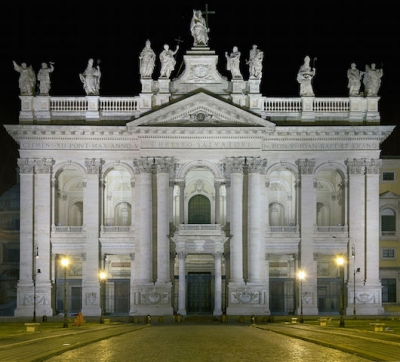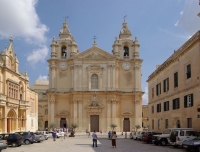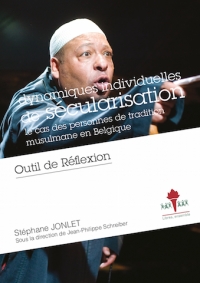La sécularisation en Italie : modèles abstraits et réalité
- Auteur Giuseppe Casuscelli
L’ordre constitutionnel a élevé la laïcité au rang de principe suprême de la République italienne. Elle s’inspire de valeurs « séculières » telles l’égalité devant la loi sans distinction de religion, l’égale liberté religieuse pour toutes les confessions, la séparation de l’Église et de l’État, l’organisation des rapports bilatéraux avec les différentes confessions et l’interdiction de discriminer les associations cultuelles et religieuses. Le texte constitutionnel reconnaît l’apport spécifique du facteur religieux et encourage sa réalisation, parce qu’il participe au progrès spirituel du pays et au développement de la personnalité des individus. Toutefois l’expérience montre que le projet constitutionnel n’a pas encore été réalisé en raison d’un concours de facteurs d’ordre juridique, historique, social et politique.
Malta: a society with values in turmoil
- Auteur Mario Vassallo
No tourist visiting Malta would nowadays repeat what a traveller to Malta, quoted by John Wignacourt in his 1914 book The Odd Man in Malta, said in 1914 — ‘Malta would have been a delightful place if every priest were a tree…’! Contemporary Malta is much greener than what it was when the Knights of St John were given the arid island in fief in 1530 AD, even though current debate often focuses on the current government’s alleged lack of concern for the environment in its drive to appease the developers. But also because the number of priests has dwindled significantly over the last half a century, and the cry of ‘Malta Kattoliċissima’ (“Malta the most Catholic”) no longer holds sway.
Le synode sur la famille : la montagne qui accouche d’une souris ?
Ce 25 octobre, les 253 participants au Synode des évêques sur la famille, réunis depuis le 4 octobre, ont conclu leurs travaux et approuvé un texte élaboré par une commission de dix membres nommés par le pape. Le contenu de ce texte, publié en italien, est abondamment commenté et sera prochainement suivi de la rédaction d’une Exhortation apostolique par le pape François. Il en ressort qu’aucune modification n’a été apportée sur les questions sensibles – et attendues – que sont la place des personnes homosexuelles dans l’Église, la contraception et l’accès à la communion des divorcés remariés. On y retrouve en outre les condamnations attendues de l’« idéologie du genre », de l’avortement, de l’éducation sexuelle, du mariage entre personnes du même sexe ou encore de l’euthanasie.
The struggle for LGBT rights in Lithuania, between religion and human rights
- Auteur Milda Alisauskiene
On June 16, 2015 media reports quoted Prime Minister Algirdas Butkevicius as saying that a civil partnership bill was being discussed with the leaders of the Lithuanian Roman Catholic Church. The discussion centered around whether or not the bill would apply to both heterosexual and homosexual couples. Butkevicius was confident that there were grounds to reach a common agreement, but a few days earlier, Minister of Justice Juozas Bernatonis, opposed to civil partnership for homosexual couples but in favor of heterosexual partnership, had boldly stated that he did not see any problem in homosexual couples living outside of any legal regulation, deeming them “statistically irrelevant” and incompatible with traditional family values.
Dynamiques individuelles de sécularisation. Le cas des personnes de tradition musulmane en Belgique
- Auteur Stéphane Jonlet
En juin 2014, ORELA remettait à son commanditaire, le Centre d'Action laïque, le rapport final d'une étude réalisée par Stéphane Jonlet et consacrée aux "Dynamiques individuelles de sécularisation : le cas des personnes de tradition musulmane en Belgique". Ce rapport, rendu public depuis, a tenté d’apporter une meilleure compréhension du vécu de ceux qui, liés d’une manière ou d’une autre au « monde musulman », se sont éloignées de ses pratiques et croyances religieuses.
Belgique : nouveau procès contre la Scientologie
- Auteur Caroline Sägesser
Un nouveau procès mené à l’encontre de l’Église de Scientologie débute à Bruxelles ce 26 octobre. L’Église de Scientologie de Belgique et le Bureau européen de l'Église de Scientologie internationale, ainsi que certains de leurs responsables, comparaissent en effet devant le tribunal correctionnel. Les chefs d’accusation sont lourds et englobent la qualification d’organisation criminelle. La Scientologie, qui s’était faite plutôt discrète en Belgique ces derniers temps, bien qu’elle bénéficie d’implantations luxueuses dans la capitale de l’Europe, est ainsi appelée à revenir à la une des médias.
L’abattage rituel en Belgique : retour sur une polémique
- Auteur Caroline Sägesser
En 2015, le nombre d’abattages rituels d’un ovin dans le cadre de la fête de l’Aïd el Kébir a diminué drastiquement en Belgique. En cause, l’interdiction des abattoirs temporaires dans deux régions du pays (la Flandre et la Wallonie) et un boycott des autres structures largement suivi au sein de la communauté musulmane. Cette évolution annonce-t-elle une interdiction générale de l’abattage sans étourdissement préalable, une question qui revient régulièrement dans l’actualité ces dernières années, en Belgique comme dans d’autres pays européens ?












 MangoGem
MangoGem